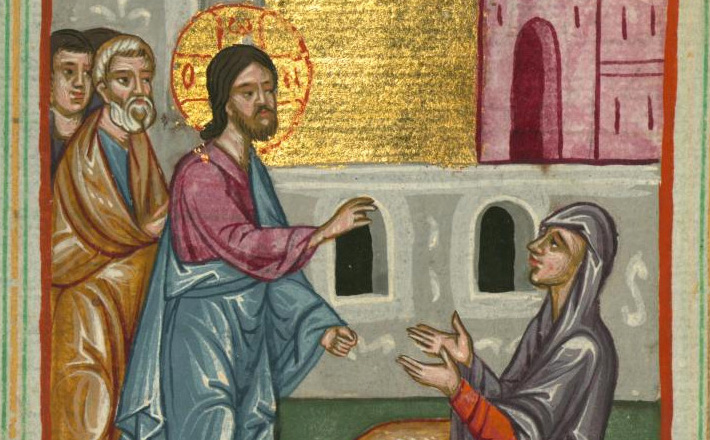Commentary on Isaiah 56:1, 6-8
Isaiah 56:1-8 radically expands the boundaries for being included among God’s people.
Written at a late stage in the development of the book of Isaiah, the text synthesizes claims in the book about human action and divine action. And reflecting ongoing disagreement about how the post-exilic Jewish community should define itself, it invites us to consider the lines we draw that exclude or include persons in our communities.
Human action and divine action
The Hebrew word tsedeq/tsedaqah, which is normally translated “righteousness,” appears twice in Isaiah 56:1. The first time, it refers to proper human behavior: “do what is right.” The second time, it refers to divine liberation “my deliverance (will) be revealed.” The Hebrew word can mean both, because its range of meaning includes the state of being right and the result of right action. It’s difficult to capture these nuances with a single word in other languages, so NRSV and other recent Bible translations don’t reproduce the repetition in the verse.
Such play on multiple meanings of a word is common in poetry, but it’s especially interesting here because of where the verse occurs in Isaiah. These two connotations of tsedeq/tsedaqah roughly correspond to how the term is used respectively in the first two major divisions of the book, Isaiah 1-39 (“First Isaiah”) and Isaiah 40-55 (“Second Isaiah”). In First Isaiah, it frequently refers to proper treatment of others, which is God’s fundamental expectation for humans (for example, Isaiah 1:26; 33:15), especially the Davidic ruler (9:6; 16:5). With this meaning, it’s often paired with the word “justice” (Hebrew mishpat), just like it is in the first half of Isaiah 56:1. Unfortunately, Israel and Judah fail to meet God’s demands: “He expected justice, but saw bloodshed; righteousness, but heard a cry!” (5:7). This failure ultimately leads to the demise of the two kingdoms. In Second Isaiah, by contrast, tsedeq/tsedaqah typically refers to God’s promised deliverance of the Judean exiles in Babylon. As in the second half of Isaiah 56:1, it’s frequently paired with “salvation” (Hebrew yeshu’ah or teshu’ah; see 45:8; 46:13; 51:5-6, 8).
Isaiah 56:1 marks the beginning of the final major division of Isaiah (chapters 56-66, “Third Isaiah”), and it ties together the earlier divisions by combining the two uses of this important word.1 In the chapters that follow, it appears with both meanings (human behavior: Isaiah 58:2; 59:4, 14; 64:4; divine liberation: 59:17; 62:1; 63:1). In this way, the book of Isaiah makes an important theological claim about the relationship between human and divine action. On the one hand, God acts for good in the world even when humans fail to do what’s right. God delivers the exiles from Babylon despite their moral shortcomings. On the other hand, the expectation for divine action should motivate efforts to establish a more righteous social order. The imminence of “my salvation” encourages and empowers God’s people to “maintain justice and do what is right.
Radical inclusion
As Judean exiles began returning to Jerusalem in the late fifth century BCE, the boundaries of the worshipping community had to be renegotiated, especially after the rebuilding of the temple. Some voices argued for defining the community narrowly among ethnic lines (see Ezra 9:1-3; Nehemiah 13:1-3, 23-27; Ezekiel 44:6-7). From a later Christian perspective, these arguments might seem misguided, but we shouldn’t criticize them too quickly. The post-exilic Jewish community was small and vulnerable. Strict enforcement of boundaries might aid communal survival. And let’s not forget that, even today, Sunday mornings remain “the most segregated hour of the week” for most American Christians, in the words of Martin Luther King, Jr.
Isaiah 56:3-8 offer a more expansive vision of the makeup of God’s people. (Although the lectionary jumps from verse 1 to verses 6-8, the intervening verses are necessary for understanding the passage as a whole.) Two classes of people who were previously excluded from the community are now welcomed into it: foreigners and eunuchs. These verses are likely a direct response to Deuteronomy 23:1-6, which denied access to “the assembly of the LORD” to Ammonites, Moabites, and men with damaged genitals. Nehemiah 13:1-3 appeals specifically to these laws as warrant for the continued exclusion of ethnic non-Jews from the post-exilic community.
Isaiah’s inclusion of these marginalized groups isn’t just a token nod to diversity. Their envisioned participation in the worshiping community is full and robust. Not only are eunuchs allowed into the temple, but God offers them permanent memorials there to compensate for their lack of descendants to carry on their names (Isaiah 56:5). And God doesn’t wait for devout foreigners to find their way to the temple (the “if you build it, they will come” approach). Rather, God “will bring (them) to my holy mountain.” Their prayers and sacrifices will be accepted, and their worship will be “joyful” (verse 7). In the final verse of the passage, God promises to continue bringing new people into the community (verse 8). Historically, this reflects the reality that exiled Judeans returned in waves over multiple centuries. Theologically, it reflects the persistent trajectory across scripture to expand the boundaries of God’s people in ever more inclusive ways.
This week’s New Testament readings offer rich points of contact with Isaiah 56. In Matthew 15:21-28, Jesus encounters a deeply faithful foreign woman, who forces him to rethink his own narrow conceptions of the boundaries of God’s people. And in Romans 11:1-2a and 29-32, Paul insists that including Gentiles among God’s people doesn’t mean God has rejected Jews. This is an important caution for Christians to remember, given the persistence of supercessionism—the problematic belief that Christianity has replaced Judaism—and dramatic recent increases in anti-Semitic hate crimes. Widening the scope of our welcome must always serve God’s intention to “be merciful to all” (Romans 11:32).
Notes
- See Rolf Rendtorff, “Isaiah 56:1 as a Key to the Formation of the Book of Isaiah,” in Rendtorff, Canon and Theology: Overtures to an Old Testament Theology (Minneapolis: Fortress, 1993), 181-89.


August 16, 2020